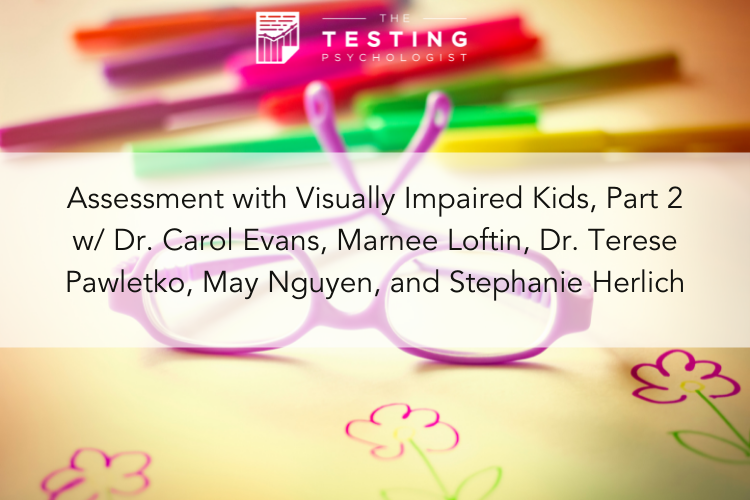Podcast: Play in new window | Download | Embed
Would you rather read the transcript? Click here.
Welcome to the second episode in a two-part series on assessment with visually impaired kids! I’m honored to have five highly accomplished and knowledgeable women on the show to discuss this complex and nuanced topic. Each of the guests brings their own unique perspective and experience to the discussion, creating a rich conversation that covers a LOT of ground. In this second episode, we dive deep into the overlap of VI and other learning or behavioral concerns. Topics that we discuss include:
- Qualitative and non-standardized assessment practices
- VI and learning disorders
- VI and autism spectrum disorder
- Deafblindness
Cool Things Mentioned
Intelligence Testing of Individuals Who Are Blind or Visually Impaired by Stephen Goodman, Marnee Loftin, and Dr. Carol Evans is posted on the American Printing House for the Blind and is an excellent resource for guidance on testing students who are blind or visually impaired (2011).
Psychoeducational Assessment of Students Who Have Visual Impairment: Perspectives of Teachers of Students Who Are Blind or Who Have Low Vision and School Psychologists is a doctoral dissertation by Dr. Carol Anne Evans (2007).
Most school psychologists already have assessment textbooks by Dr. Jerome M. Sattler on their bookshelves since many graduate programs include his series of books as required foundational reading. In the Foundations of Behavioral, Social, and Clinical Assessment of Children, Sixth Edition, chapter 20 is dedicated to visual impairments and co-authored by Dr. Sattler and Dr. Carol Anne Evans (2014).
Previous Webinars & Handouts
- Collaborative Psychoeducational Assessments: Visually Impaired Teachers & Evaluators Working Together (~1.5 hrs, 5/10/21) by Dr. Terese Pawletko and Dr. Carol Evans; handout
- Collaborative Evaluation: Working Together (1 hr, 5/10/21) by Marnee Loftin; handout
- Psychoeducational Evaluations of Students with Visual Impairments (~3hrs, 5/12/21) by California School for the Blind Assessment Center team; handout (currently 84 pages)
- BVIPsych Couch Chat (~1.5 hrs, 6/9/21) with all of us and additional CSB team members; handout
Making Evaluations Meaningful was written by Marnee Loftin (2006). A new edition will be released through the Texas School for the Blind and Visually Impaired Store hopefully sometime soon. Marnee generously has permitted excerpts from her book to be posted on Paths to Literacy.
Jack Dial and Cognitive Test for the Blind
The California School for the Blind Assessment Team has created a self-paced CVI Course using the Google Classroom platform. The class is free and perfect for anyone (teachers, paraprofessionals, specialists, families, etc.) who would like to gain a better understanding of
Cerebral/Cortical Visual Impairment (CVI). The course covers what is CVI, causes, characteristics, screening and assessment tools, the CVI Range, and report writing.
Kancherla et al
Childhood vision impairment, hearing loss, and co-occurring autism spectrum disorder
Autism Spectrum Rating Scale
STACS: Standardized Tactile Augmentative Communication Symbols Kit
To gather more meaningful data on adaptive behavior, consider Independent Living Skills (ILS) Checklist from Michigan Department of Education Low Incidence Outreach, which is a great tool to consider to gather information collaboratively.
Assessment Tools to Consider for MD & DB
- Child-guided Strategies: The Van Dijk Approach to Assessment book contains guidelines for conducting an assessment for children with sensory impairments and multiple disabilities following the Van Dijk approach (e.g., no standardized protocols or materials, follows the lead of the individual child). Video examples of this approach are available.
- Strategies for Assessing and Teaching Students with Visual and Multiple Disabilities by Millie Smith. The Sensory Learning Kit (SLK) – Guidebook and Assessment Forms are available from APH.
- Expanded Core High School Readiness Checklists from Utah School for the Blind address different grade ranges. For students who have multiple impairments, use the alternative checklist for students with severe multiple impairments in the PK‐K checklist on pages 50 to 51. You can request a free copy of the checklist by completing the Expanded Core Curriculum – High School Readiness Checklist Request Form.
- Learning to Listen Listening to Learn contains an informal checklist that includes items in the areas of auditory attention (maintaining attention, figure-ground discrimination), auditory discrimination, auditory memory (concepts and directions, sequence), listening skills for reading readiness, and social listening.
- The Personal Preference Indicator enables the planning team to identify and focus on preferences connected to choice-making activities, person-centered planning, and self-determination efforts.
- Communication Matrix: The Communication Matrix has created a free assessment tool to help families and professionals easily understand the communication status, progress, and unique needs of anyone functioning at the early stages of communication or using forms of communication other than speaking or writing. This is available in multiple languages.
- How We All Learn (Campano, 2016): “This workbook is not an assessment tool, but rather a structured tool to provide technical assistance for educators and related service providers working with students who do not have a formal communication system.”
- Home Talk is “an assessment tool for parents and care providers of children who are deafblind and who have other disabilities…HomeTalk can provide a broad picture of your child’s skills, special interests, and personality.”
Podcast Panelists’ Bios and Contact Info
Featured Resource
I am honored to partner with PAR for 2021 to bring you featured items from their catalog! Listen to each episode for specific product recommendations and links. Learn more at www.parinc.com.
The Testing Psychologist podcast is approved for CEU’s!
I’ve partnered with At Health to offer CE credits for podcast episodes! Visit this link to access current and past episodes available for CE credit. You can use code “TTP10” for a discount on ALL the course credits you purchase from At Health!
About Dr. Jeremy Sharp

I’m a licensed psychologist and Clinical Director at the Colorado Center for Assessment & Counseling, a private practice that I founded in 2009 and have grown to over 20 clinicians. I earned my undergraduate degree in Experimental Psychology from the University of South Carolina before getting my Master’s and PhD in Counseling Psychology from Colorado State University. These days, I specialize in psychological and neuropsychological evaluation with kids and adolescents.
As the host of the Testing Psychologist Podcast, I provide private practice consulting for psychologists and other mental health professionals who want to start or grow psychological testing services in their practices. I live in Fort Collins, Colorado with my wife (also a therapist) and two young kids.
Ready to grow your testing services? Click below to schedule a complimentary 30-minute pre-consulting call!

